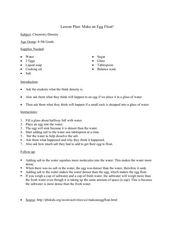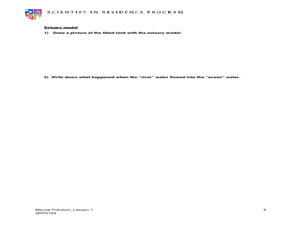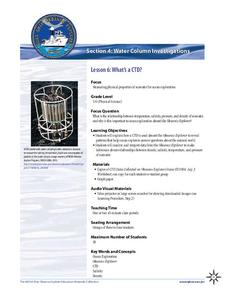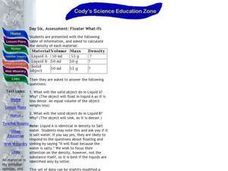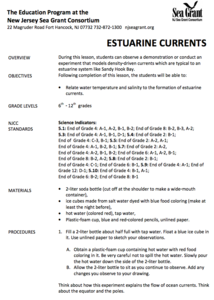Curated OER
What Floats Your Boat?
This open-ended boat building exercise is meant to be part of a three-lesson series on ships. Links to the other two lessons are included. This particular part is mostly a group lab activity in which they build a boat, find its load line...
Centers for Ocean Sciences
Ocean and Great Lakes Literacy: Principle 1
Is your current lesson plan for salt and freshwater literacy leaving you high and dry? If so, dive into part one of a seven-part series that explores the physical features of Earth's salt and freshwater sources. Junior hydrologists...
Curated OER
Make An Egg Float!
Students analyze density. In this density lesson, students experiment with floating an egg. Students discover that salt added to water changes the density of the water allowing an egg to float.
PBS
Ocean Circulation in the North Atlantic
Swirling and churning, the waters of the North Atlantic play a vital role in Earth's climate! Discover the many factors that produce circulation using a multimedia lesson from PBS's Weather and Climate series for high schoolers. Scholars...
Curated OER
Liquids of Different Densities
Students compare the densities of different liquids. In this liquids lesson plan, students compare color, viscosity, weight, volume, and graph their findings.
Curated OER
Salinity Lab
In this salinity learning exercise, students simulate conditions of salt and fresh water mixing and observe the various densities of these solutions based on their salinity.
Curated OER
Modeling Estuaries
Students create a model estuary. In this modeling estuaries lesson, students identify characteristics and mix water of varying densities. Students form a hypothesis, conduct an experiment, and analyze the results.
Curated OER
Density, Iron, and Anemia
Students explain what factors determine density. In this physics activity, students hypothesize which objects are less dense. They cite the importance of density in everyday life.
Curated OER
The Great Ocean Conveyor
Learners investigate water density. In this water density lesson plan, students conduct an experiment with food coloring, water and salt to see how the salt effects bodies of water.
Curated OER
The Weight of Water
Students examine how salt water is more dense than fresh water through experimentation with eggs.
Curated OER
Water Density and Stability Lab
Students observe how different water densities and salinity control the depth at which different water masses occur. Submarines are used as a case study. This is a well-designed with an excellent worksheet.
NOAA
What's a CTD?
Why are the properties of the water important when exploring the ocean? Young scientists discover the tools and technology used in deep sea exploration in the fourth installment in a five-part series. Groups work together to examine...
Curated OER
Density Graph Questions
In this density worksheet, students use the mass of aluminum and copper at different volumes to create a graph in order to calculate the density of these metals. This worksheet has 1 graph, 2 short answer, and 5 word problems.
Curated OER
Water Density Boundaries
Young scholars create observable layers in water that represent a separation based upon density differences. They model density boundaries using differences in temperature and salinity. They, in groups, perform a meaningful experiment...
Curated OER
The Floating Golf Ball
Learners explore density by floating golf balls. They explore having their golf balls float halfway in a container of water and discuss density and its realtionship to where the golf balls are floating. After adding food coloring, they...
Curated OER
"Eggs-perimenting" Fun
Young scholars dissolve salt into water, place an egg into a glass of salt water, observe and record observations, make a scientific hypothesis, summarize what they studied from this hands-on experiment. They share their ideas and...
Curated OER
Floating Pencil
Students discover how salt water makes a pencil float better than freshwater by measuring and comparing the lengths of the portion of the pencil that floats above the water surface. They then determine if an unknown water sample is...
Curated OER
Day Six: Floater What Ifs
Young scholars observe earth science by examining results from an experiment. In this buoyancy lesson, students practice floating different items in two different liquids and identify why certain objects will float and others sink. Young...
Curated OER
The Weight of Water
Students examine how salt water is more dense than fresh water. They discuss how manatees need to float and sink, conduct a sink or float experiment, and conduct an experiment with eggs and salt and fresh water.
Curated OER
Stacking Water
Young scholars experiment with different salinities of water using straws and different colors of water. They collect and interpret data from the experiment.
Curated OER
Buoyant Behavior
Combine science and literature with this lesson plan on buoyancy. Read There's an Ant in Anthony by Bernard Most to examine words containing the letters a, n, and t. Then introduce your class to the word "buoyant." Demonstrate how an egg...
Curated OER
Seashore Explorers
There are three separate lessons within this resource that can be used together, or that can each stand alone. In the first, five simple activities allow junior scientists to examine the amazing properties of water. In the second, they...
Curated OER
Estuarine Currents
Students experiment observing a demonstration on models of density-driven currents which are typically found in an estuarine system of water flow. They compare/contrast water temperature and salinity to the formations of estuarine currents.
Curated OER
Frozen Water Before? I'm Sure You Have; But I Bed You've Never Frozen Salt Water! Water!!
Students examine what happens to salt water when it freezes. In groups, they measure density and salt concentrations in different samples of water and record its freezing time. They discuss the relationship between water density and...




